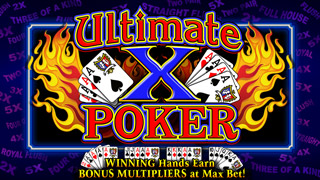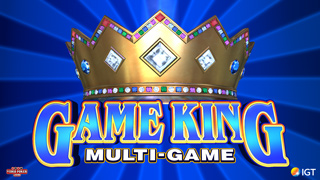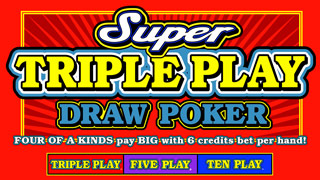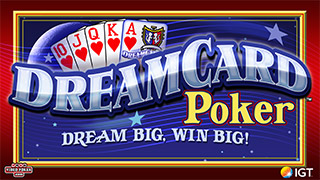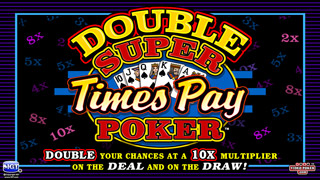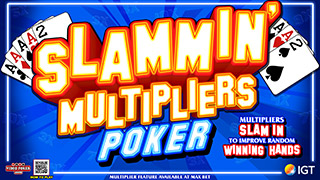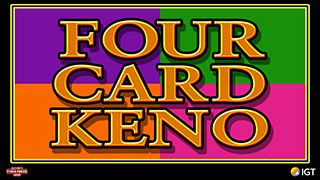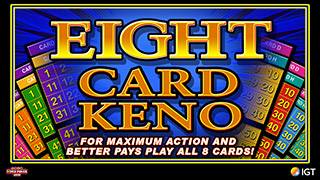A year of Quads - 2011
-
brmcc74
- Senior Member
- Posts: 295
- Joined: Wed Dec 30, 2009 7:19 pm
Re: A year of Quads - 2011
I guess I see this from another angle. VP is random. There are no "laws' of the quality of quads that we will recieve. Am I alone in this? I think that this is what alot of people dont understand about true randomness. I can admire the record keeping, but am not at all surprised at the results. Randomness= no guarantees either way.
-
shadowman
- Video Poker Master
- Posts: 3587
- Joined: Mon Oct 23, 2006 5:42 pm
brmcc74, while you are correct, it gets down to probabilities. It would not be that unusual to see half the quads in 20-30K hands. But for 1.3 million hands the odds go way, way down. Maybe new2vp will compute the odds for us but I'd guess less than 1 in billion (I know I should never guess).
-
brmcc74
- Senior Member
- Posts: 295
- Joined: Wed Dec 30, 2009 7:19 pm
brmcc74, while you are correct, it gets down to probabilities. It would not be that unusual to see half the quads in 20-30K hands. But for 1.3 million hands the odds go way, way down. Maybe new2vp will compute the odds for us but I'd guess less than 1 in billion (I know I should never guess).
The way that I see it is that SPX could very well double his quad take on the next 1.3 million hands. The quality would/could change too. He can also do worse. One thing that Im certain of is that it wouldnt be the same. This is my opinion and only true way to define randomness (for me). This thread, aka example really gets to the heart of it.
The way that I see it is that SPX could very well double his quad take on the next 1.3 million hands. The quality would/could change too. He can also do worse. One thing that Im certain of is that it wouldnt be the same. This is my opinion and only true way to define randomness (for me). This thread, aka example really gets to the heart of it.
-
New2vp
- Video Poker Master
- Posts: 1882
- Joined: Mon Sep 11, 2006 4:02 am
brmcc, randomness does mean in a way that anything can happen, but when
you accumulate results as spx did, it doesn't mean that anything can
happen with equal probability. If you randomly landed golf balls on a
green, two things can happen, the ball goes in the hole or it doesn't;
it doesn't surprise any of us that the ball goes in the hole
considerably less than 1/2 the time. But with 1.3 million shots, it
would also be surprising if it never went in.It is certainly ok to use your intuition to guide you, but sometimes the math helps. And then we can actually have improved intuition to guide us the next time we need it.
There are some results that are just too improbable to reasonably be
explained by the assumptions given in an experiment. If you do not work out the probability, most of us simply have no way of knowing whether something is reasonable or not.You can try and settle differences in opinion by shouting "Is too!" in response to another's "Is not!" but that generally doesn't change too many minds to allow for reaching consensus. For most of our history, we did not have the statistical tools to make these types of decisions, but for the last century or so, we do. Lots of scientific discoveries more important than the proper number of quads in a year depend on these tools.Is having 1/2 the expected frequency of quads so odd as to be unreasonable? It really depends on how many hands have been played (as shadowman suggested). With 1,300,000 hands, the total number of quads reported by spx is about 27 standard deviations below what would be expected. People start to get suspicious when a number is about 2 standard deviations below the mean; most everyone is concerned at 3 standard deviations without mitigating circumstances. There really is no question when we are in the vicinity of 6 to 10 or more standard deviations. brmcc, you may still not be convinced by these numbers (not everyone is trained to react to their impact and, if you simply are relying on me, well, you don't know me--I could be lying**), but, as a precaution, you shouldn't bet anything valuable on your opinion at this point if you haven't changed it.The idea of most
statistical tests of this type is to
(1) assume randomness
(2) observe the results
(3) compute the probability that results would be at least as extreme as
what was observed under the assumption of random uniform card
distribution
(4) if the probability is too low, then you often conclude that your
assumption must have been faulty (or something about the problem setup
is amiss); in this case the assumption is randomness
What does it mean for the probability to be too low? This is
where some subjectivity comes in. Often the target probability is set
at a number like 5% or 1%; if the actual probability is lower than this
target, we reject our hypothesis of randomness. Of course this means
that you could have some probability of being incorrect in concluding
that your assumption was faulty. With spx's "experiment," there is no
problem with this subjectivity as the probability of seeing results this
extreme is way, way, way lower than just about anything any of us can
imagine.[What does it mean if the probability is higher than our target? That is not the case here, but generally,
one says something like, "On the basis of this test, I cannot reject a
hypothesis of randomness," which is subtly different than actually
accepting randomness.
I don't know if you are an NFL fan, but this is a little like the
officials, after watching the instant reply in ruling on the challenge,
saying that the "ruling on the field stands" rather than "the ruling on
the field is confirmed." In the former, the referee saw insufficient
evidence to overturn the ruling even though he didn't have enough evidence to know for certain that the original call was correct.]
Shadowman, the evidence is on the side of your initial gut feel that something must be wrong with the
numbers (either the machines played were not random or something else
about the report must be different than stated). The probability of
seeing a result this extreme if there was indeed randomness in card
selection (and spx was playing any reasonable strategy that didn't try
and reduce the frequency of quads) is way lower than one in a billion
(which would have 8 zeros to the right of the decimal point before the
first nonzero digit: 0.000000001). For results this extreme, we would
have to set the probability by placing more than 100 zeros to the
right of the decimal place before the first nonzero digit. Below you
will see that I would guess the probability to be about 10^(-160).*
How low is that?Let's assume that everyone who has ever been born on the planet earth
lived for 1000 years each and played video poker every year. That would
be around 100 billion people, 10^11 people x 10^3 years = 10^14. That
would set the expected number of years that were as extreme as what spx
experienced to be 10^(-160) x 10^14 = 10^(-146).
Let's put this in perspective. My odds of winning the Mega Millions
jackpot 17 days in a row after buying a single $1 lottery ticket each day is
(1/175,711,536)^17, which is about 10^(-140).
So, it is about a million times more likely for me to win Mega Millions 17 days in a row
than it would be for even one person having one year during the
imaginary history of the earth with as few quads as spx experienced.
I'm still not probably not going to expect much when buying that next
lottery ticket. And I don't want to play where spx has been playing.
As brmcc suggested, anything can happen, but as shadowman concluded, the
probability, given the assumptions is just too remote, to conclude that
everything was in order.
*The calculation of positive numbers this low requires
numerical methods that have some error associated with them so while I'm confident that the probability is low, I would presume some uncertainty here. The
routine in Excel to calculate the exact probability using the binomial
distribution underflows and returns exactly zero; the same result occurs
if you use the Poisson approximation; Excel handles addition/subtraction well down to 10^(-15) and handles multiplication/division down to much lower numbers, so the probability is really low. The normal distribution approximation returns a
number on the order of 10^(-160) indicating 159 zeros before the first
nonzero digit. I used 1495 quads in 1,300,000 trials and a probability
of 0.002278, 1 quad per 438.9816 plays (figuring in a conservative
probability if most of the play that wasn't TDB and DDB was deuces
wild).**It is reasonable to presume that some who post here are not always 100% sincere in what they say. Quoting one of my favorite TV characters, "Everyone lies!" (Gregory House) Some of us believe anything against what we currently believe must be a lie; others believe everything. In my view, both philosophies will get you in trouble. You should be able to filter out at least some of the lies, while still allowing the chance that you can consider some things to be true. That way we can learn new things without being a sap.
-
brmcc74
- Senior Member
- Posts: 295
- Joined: Wed Dec 30, 2009 7:19 pm
If you randomly landed golf balls on a green, two things can happen, the ball goes in the hole or it doesn't; it doesn't surprise any of us that the ball goes in the hole considerably less than 1/2 the time
RNG randomness can not be compared to anything but what it is. Each deal is new.
These are seperate things that can not be combined but lead to believed that is a singular event. IMO. Just for arguement sake. Randomness is unique where I personally dont believe math answers 100% accurate in relation to the probability. Randomness is only accurate to itself and its outcome. This is why some people can be ahead and some behind. This is very interesting to me. The only interesting thing left for me and vp is the randomness because it all depends and comes down to this.
RNG randomness can not be compared to anything but what it is. Each deal is new.
These are seperate things that can not be combined but lead to believed that is a singular event. IMO. Just for arguement sake. Randomness is unique where I personally dont believe math answers 100% accurate in relation to the probability. Randomness is only accurate to itself and its outcome. This is why some people can be ahead and some behind. This is very interesting to me. The only interesting thing left for me and vp is the randomness because it all depends and comes down to this.
-
shadowman
- Video Poker Master
- Posts: 3587
- Joined: Mon Oct 23, 2006 5:42 pm
Thanks, new2vp. I thought the number would be much lower than 1 in a billion but I figured that was low enough to make the point.
Now, I think we can conclude that the results were not simply random variation. I'll also assume spx didn't miss that many quads. While a few might be missed it's more likely <<10%. I know because I keep track of certain hands myself. I also don't see any strategy plays mentioned so far as having a significant chance of reducing quads.
So, that pretty much means the games being played are not really random. We know there's a technology out there that looks like standard VP but the results are not completely random. They are VLTs or class II machines.
I'd sure like to see a breakdown by casino.
Now, I think we can conclude that the results were not simply random variation. I'll also assume spx didn't miss that many quads. While a few might be missed it's more likely <<10%. I know because I keep track of certain hands myself. I also don't see any strategy plays mentioned so far as having a significant chance of reducing quads.
So, that pretty much means the games being played are not really random. We know there's a technology out there that looks like standard VP but the results are not completely random. They are VLTs or class II machines.
I'd sure like to see a breakdown by casino.
-
New2vp
- Video Poker Master
- Posts: 1882
- Joined: Mon Sep 11, 2006 4:02 am
RNG randomness can not be compared to anything but what it is. Each deal is new.
These are seperate things that can not be combined but lead to believed that is a singular event. IMO. Just for arguement sake. Randomness is unique where I personally dont believe math answers 100% accurate in relation to the probability. Randomness is only accurate to itself and its outcome. This is why some people can be ahead and some behind. This is very interesting to me. The only interesting thing left for me and vp is the randomness because it all depends and comes down to this.Actually random number generators have been the subject of substantial research in the last 20 years or so. Not all of the early generators worked as desired. By "worked," I mean simulated random events that occur in nature reasonably well (such as radioactive decay of uranium atoms). The very purpose of RNGs is to simulate real world events, so suggesting a separation that can be identified between RNG simulation and other random occurrences is ill-conceived.You can GOOGLE Diehard tests or just randomness tests. (No reference to Bruce Willis is intended; I believe that naming of the randomness tests preceded the premiere of the movie series.) These tests are used to separate good RNGs from imposters. The use of poor RNGs will produce poor experimental results, so it has been an important scientific tool to analyze these and eliminate the pretenders.Any RNG that would have produced numbers that allowed a result 27 standard deviations below the theoretical mean would have easily failed some of these tests because of built-in systematic error and hence simply been a "number generaror" with a deemphasis on the word "random." So it is reasonable to presume that another better RNG would have taken its place since today there are several good ones to choose from.The smart money is on something being amiss with spx's numbers. The reduction in quads was purposeful, not random.
-
spxChrome
- VP Veteran
- Posts: 819
- Joined: Tue Nov 07, 2006 9:21 pm
New2vp, I have a pretty easy method of tracking for the past 3 years and I don't drink while I play. While I admit its prone to user error but if at best I may have missed a quad or two but impossible to miss so many to skew the numbers this much. I track other things besides just quads, such as RF & Suite, SF, deuces if wild or not and I also note if a quad A,2,3,4 was with the kicker or not and obviously won/loss $$ and time played for each session. @shadowman I didn't start logging casinos until about 6 months ago. I mainly started this to see when to play certain games due to a long stretch of AWAK/Dueces and such and it just turned into a math habbit/addiction. But anyay for this show and tell I was just focusing on the quads. So I went back to the beggining and here is a 3 year total of my numbers for quads. This is about 4+ million hands worth of quads.
A - 572
2 - 512
3 - 252
4 - 363
---------
05 - 537
06 - 537
07 - 496
08 - 624
09 - 672
10 - 532
-----------
J - 501
Q - 395
K - 332
This takes my quad average closer to about 1 / 668 hands. What I take from after looking at the numbers by year is my first year in which I played more often and had a better year the numbers were noticeably closer than the past 2 years. What is odd is at the end of November of that 1st good year is when the casino was bought out and they came in and changed all the chips in the VP machines. However, the paytables stayed the same. So when I look at 2010 and 2011 this is when the mid number quads started to seperate. This year it was the 8, last year it was the 9 that was off the chart. You would think the farther you go out in hands and numbers the closer they should become, but as you can see they do not. I would expect out of 4 million hands there would not be so much deviation, especially with my strategy towards the A,2,3,4 and by default play for the J,Q,K.
A - 572
2 - 512
3 - 252
4 - 363
---------
05 - 537
06 - 537
07 - 496
08 - 624
09 - 672
10 - 532
-----------
J - 501
Q - 395
K - 332
This takes my quad average closer to about 1 / 668 hands. What I take from after looking at the numbers by year is my first year in which I played more often and had a better year the numbers were noticeably closer than the past 2 years. What is odd is at the end of November of that 1st good year is when the casino was bought out and they came in and changed all the chips in the VP machines. However, the paytables stayed the same. So when I look at 2010 and 2011 this is when the mid number quads started to seperate. This year it was the 8, last year it was the 9 that was off the chart. You would think the farther you go out in hands and numbers the closer they should become, but as you can see they do not. I would expect out of 4 million hands there would not be so much deviation, especially with my strategy towards the A,2,3,4 and by default play for the J,Q,K.
-
shadowman
- Video Poker Master
- Posts: 3587
- Joined: Mon Oct 23, 2006 5:42 pm
spx, I think 6 months of data would be enough to get a better feeling as to what is going on. You don't have to name the casinos just call them A, B, C if you prefer.
I would suspect the casino where you play 50% of the time is most likely the problem.
I would suspect the casino where you play 50% of the time is most likely the problem.
-
brmcc74
- Senior Member
- Posts: 295
- Joined: Wed Dec 30, 2009 7:19 pm
New VP= So what you are saying is that RNG 's are tested to payout at a certain level? How can this be if they are random. Defeats the purpose doesnt it? Im asking because Im curious.



